
Topics
Guests
- Farea Al-Muslimivisiting scholar at Carnegie Middle East Center. He is based in Sana’a, Yemen. He recently wrote an op-ed headlined, “Welcome to Yemen, where only violence is a certainty.” He last joined us in 2013 when he was in the United States to testify before the Senate judiciary subcommittee hearing on the U.S. secret drone program.
A Saudi-led aerial bombing campaign has entered its second day in Yemen. The Saudi-led airstrikes are intended to thwart the advance of Shiite Houthi rebels after they seized control of the capital Sana’a last year and deposed President Abdu Rabbu Mansour Hadi last month. On Thursday, Hadi left his refuge in Aden for Saudi Arabia. At least 39 civilians have reportedly been killed so far in the airstrikes. Amnesty International reports the dead include at least six children under the age of 10. Saudi’s bombing campaign has been backed by the United States, Gulf states, Egypt, Turkey, Pakistan and Sudan. We go to Sana’a to speak with Farea Al-Muslimi, a visiting scholar at Carnegie Middle East Center. He recently tweeted: “I’m a 25 year old Yemeni man. I’ve seen at least 15 wars in my country. I don’t need more. I need some help and education & economy; not guns.”
Transcript
JUAN GONZÁLEZ: We turn now to Yemen, where a Saudi-led aerial bombing campaign has entered its second day. Saudi Arabia has targeted Houthi Shiite rebels and has been backed by the United States, Gulf states, Egypt, Turkey, Pakistan and Sudan. The Saudi-led airstrikes are intended to thwart the Houthis’ advance after they seized control of the capital Sana’a last year and deposed President Abdu Rabbu Mansour Hadi last month. On Thursday, Hadi left his refuge in Aden for Saudi Arabia. At least 39 civilians have reportedly been killed so far in the airstrikes. Amnesty International reports the dead include at least six children under the age of 10. Many analysts fear the Yemen crisis could escalate into an all-out proxy war between Saudi Arabia and Iran, which has backed the Houthis. Iran denounced the Saudi-led assault as an attempt to, quote, “foment civil war in Yemen or disintegrate the country.”
AMY GOODMAN: Saudi Arabia has reportedly mobilized 150,000 troops near the border. Egypt is saying it’s also prepared to send ground troops into Yemen if necessary. The United States has aided the bombing campaign by creating a joint planning cell with Saudi Arabia to coordinate U.S. military and intelligence support. Arab foreign ministers, meeting in Sharm el-Sheikh, Egypt, Thursday, endorsed the idea of forming a unified Arab military force.
We go directly to Sana’a, the capital of Yemen, to speak with Farea Al-Muslimi. He is a visiting scholar at Carnegie Middle East Center. He’s based in Sana’a. He recently wrote an op-ed headlined “Welcome to Yemen, Where Only Violence is a Certainty.” He last joined us in 2013 when he was in the United States to testify before the Senate Judiciary Subcommittee hearing on the U.S. secret drone program. And if you want to know what’s going on in Yemen, just follow his tweets.
I want to welcome you to Democracy Now!, Farea Al-Muslimi. Talk about what’s happening on the ground now in the capital.
FAREA AL-MUSLIMI: Thanks, Amy. It’s good to be back with you. Sana’a right now has witnessed over the last few days multiple airstrikes led by Saudi Arabia in a big, longer plan version—new military operation called the Decisive Storm, which is backed by Saudi Arabia, other Gulf countries and other regional countries. This comes in response to the Houthis’ full seizing of power in the capital of Yemen. And since last week, the political crisis in the country has entered a new dangerous level, when the Yemen air force, under the Houthi, controlling the capital, struck the presidential palace in Aden, where fled President Hadi was living. And I think, by that point, it was the time when the Gulf and the region decided to interfere. Currently, there has been multiple civic casualties of these strikes, but most of the times they are also strikes targeting military bases around the country, which are under the loyalty of either former President Saleh or the Houthis, who are accused by the regional and internationals of cooperating in this full military coup. Obviously, this comes after four years of a poorly learned political solution in Yemen, known as the Yemen model, which was backed by the United Nations and clearly ended up creating more violence than peace in Yemen.
JUAN GONZÁLEZ: And what about this issue of all of these outside powers trying to effect deals or arrangements for the internal strife within the country?
FAREA AL-MUSLIMI: Say that again, please?
JUAN GONZÁLEZ: I said, what about this issue of all of these outside countries—the United States, the U.N., Saudi Arabia—attempting to negotiate deals for how Yemen should be run?
FAREA AL-MUSLIMI: I mean, obviously, this is an outcome of the way that the specific model that was enforced by these countries for the last four years have ended up failing. That’s one part. But the new part in this is this has been now shifted from a political model, that was a massive story about how political transition should run, into a model of direct front lines for a regional obvious war between Saudi Arabia and the Iranians. Obviously, this is—this is, I think, a new regional order, you can now say, called the Decisive Storm. It’s getting more than—bigger—more than just about Yemen. And it’s being a new card being played by the regional states in the negotiation of the Iranian nuclear fire, obviously using Yemen as a fuel for a struggle that has nothing to do with the Yemenis.
AMY GOODMAN: Farea, you tweeted, “I’m a 25 years old #Yemen-i man. I v sen at least 15 wars n my country. I don’t need more. I need some help n education & economy ; not guns.” Another tweet: “I sadly can promise you that the sir strikes cost tonight could have saved Yemen from this years ago if if was put into its economy.” Talk about the situation now in Sana’a, the bombardment that you and other Yemenis are going through, and this connection that you’re describing.
FAREA AL-MUSLIMI: Obviously, Yemen has gone through a lot of conflicts in the past. And what I was trying to say in this specific tweet, probably, is that the last thing Yemen needs at the moment is an intensive military intervention in a country that is already loaded with so much conflict and over the last three years has gone through even more conflicts because of how this was run. And, obviously, this is important because even when Yemen was being promising a state, according to the Yemen model, it was not backed up with an economic Marshall Plan. The commitment to Yemen’s stability was always reactive, based on fear from al-Qaeda, which obviously has ended up in creating more violence than stopping violence.
There is a huge problem in Yemen. We have more than half of the population right now under huge—for need of humanitarian assistance. The economy is literally dead. Life has been like that. The services are bad. The already low level of low, poor services that existed are even now harder to have, like electricity, water, and basically security and safety.
So far, right now, there is a matter of—there is a problem of a slow inversion or a slow take of Yemen into a new Libyan version that will not ultimately create peace in Yemen. And, obviously, a military solution, we have tried that so many times in Yemen, and it did not win. The military—the wars happened in Sa’ada with six wars, and then in the south, and then many wars with al-Qaeda. Obviously, there is a problem with this way of handling political problems in the region.
In fact, if there is a—if there had been enough economic support, I think we could have already—you know, we could have stayed away from this chaos, how things had led to. And most importantly is, if there is a will to commit to Yemen’s stability and peace, there is a deep need to show that in an economic plan. Make Yemen part of the GCC. Give it easier for Yemeni youth to get jobs in the Gulf. A security solution have approved itself in a country like Yemen many times wrong and have counterproductive, and will always remain like that if you do not solve the roots of the problems. And the current way how things are run is obviously going anywhere but toward peace.
AMY GOODMAN: Farea Al-Muslimi, I want to thank you very much for being with us. Farea Al-Muslimi is a visiting scholar at Carnegie Middle East Center. He is speaking to us from Sana’a, Yemen. We will link to his op-ed, “Welcome to Yemen, Where Only Violence is a Certainty.” And we hope you’ll join us in the days to come to continue to report on your country.
This is Democracy Now!, democracynow.org, The War and Peace Report. When we come back, we go to London. We will be speaking with Iona Craig, a journalist who was based in Sana’a for four years, and also we’ll be joined by Brian Whitaker, former Middle East editor for The Guardian. This is Democracy Now! We’ll be back in a moment.

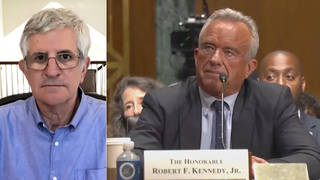
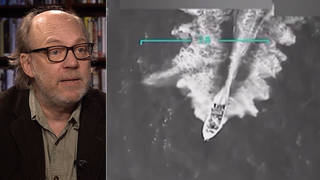
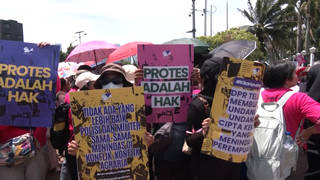
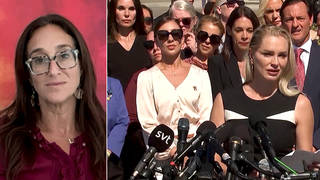





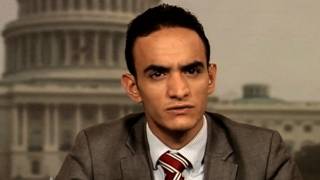
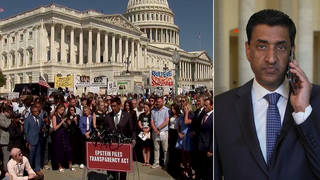
Media Options